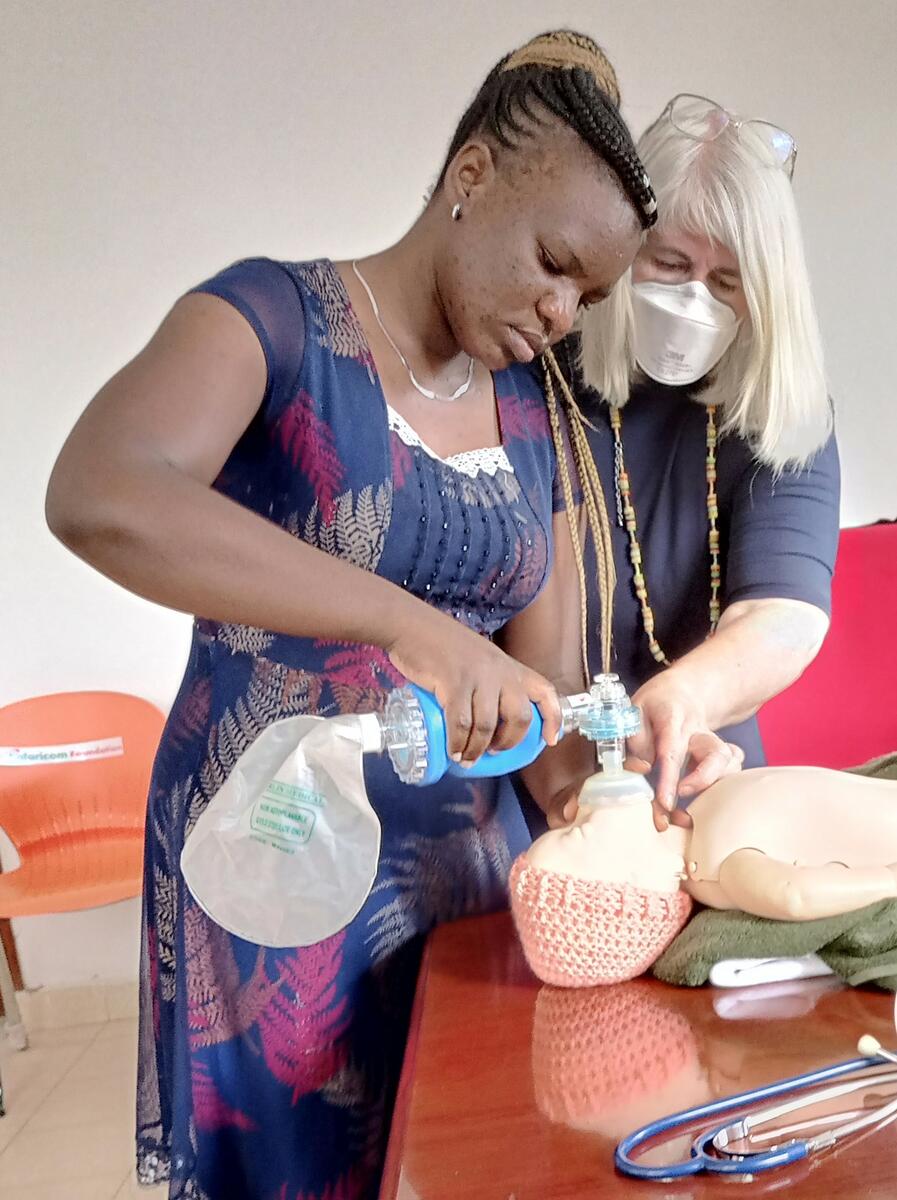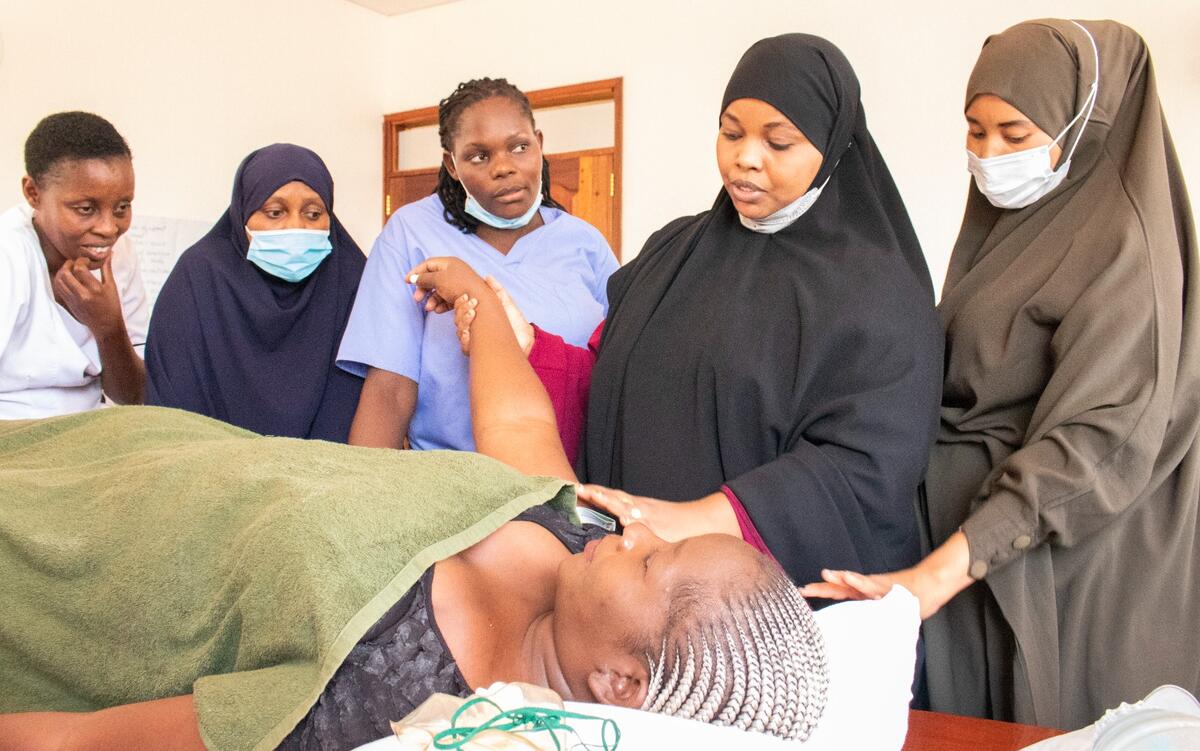
Onesmus Muchemi, Technical Officer – Liverpool School of Tropical Medicine (LSTM)
Duncan Shikuku, Senior Technical Officer- Liverpool School of Tropical Medicine (LSTM)
Helen Allott, Senior Technical Officer- Liverpool School of Tropical Medicine (LSTM)
Introduction
Mentorship is a relationship in which a more experienced or more knowledgeable person helps to guide a less experienced or less knowledgeable person. It is a learning and developmental partnership between someone with greater experience and someone who wants to learn.
Provision of EmONC services is a key strategy aimed at treating the preventable direct medical complications that cause the majority of maternal and newborn deaths. Building the capacity of skilled health personnel (SHP) in EmONC and provision of the necessary equipment and supplies are critical to ensure that EmONC services are readily available at the facilities. Previous capacity building of SHP has been through offsite trainings, largely in hotels for a standard 5-day EmONC curriculum in Kenya. This approach is costly, not sustainable and exposes the already understaffed health facilities to staff shortage. An alternative onsite facility-based mentorship can potentially minimise the costs incurred in offsite trainings and promote readiness of facilities to perform these essential emergency services.

Effective mentorship provides adequate time and a conducive environment for health care providers to practice. Evidence shows that SHP retain knowledge and skills for up to 12 months after the training and short repeat sessions or drills are required to enhance the retention and practice of the skills. In cases where there are limited obstetric cases that require EmONC interventions, these skills deteriorate faster if not practiced regularly and therefore the need for regular exposure through short, targeted sessions, best achieved through mentorship.
In 2021, the Kenya Ministry of Health with support from Liverpool School of Tropical Medicine (LSTM) developed a facility based EmONC mentorship package as a sustainable strategy to strengthen the capacity of SHP in ensuring readiness and availability of quality EmONC services at the health facilities. Competent SHP in EmONC will contribute to a reduction in the preventable maternal and newborn deaths.
Garissa county maternal and newborn health status
Garissa county is one of the 15 counties contributing 98.7% of all maternal deaths in Kenya. The maternal mortality ratio is 646/100,000 live births, higher than the national average estimated at 362/100,000 live births as at 2014. Since November 2019, with funding from the Foreign, Commonwealth and Development Office (FCDO), LSTM has partnered with Garissa County to implement a low-cost facility based EmONC mentorship in five high volume facilities to sustain the EmONC skills necessary to reverse these maternal and newborn mortality trends. The intervention is aimed at improving the capacity of SHP to recognize and manage maternal and newborn complications. This blog discusses the enablers and barriers to a successful EmONC mentorship in Garissa County.
Enablers to a successful mentorship In Garissa County
Availability of health facility based EmONC mentors
Twenty facility-based mentors were selected by the county from a pool of experienced EmONC trained SHP working in the respective health facilities. The selected mentors were trained on mentorship skills and had a refresher training on EmONC to update their knowledge and skills. The EmONC mentors have since led and supported monthly mentoring of their maternity colleagues in the facilities to date.
Regular support supervision
Frequent follow up and support supervision by senior mentors is essential after training. The senior mentors respond to challenges facing facility mentors, they support them to fill gaps in knowledge and skills and promote discussions on ways to improve sessions. Without that, mentors lack the strive to perform better, they feel deficient and demotivated. Nursing supervision and feedback was documented as an effective enabler in India.
‘The frequent follow ups and the motivation you give us make us to work harder. Without the follow up, we tend to relax’ (a mentor at Sub-County hospital, Garissa County)
Access to updated resource materials
Access to updated national MNH guidelines and reference materials enrich mentors’ sessions and enable them to share the materials with mentees for further learning and reference. These include up to date EmONC PowerPoint presentations, case scenarios, videos, and access to a lifesaving mHealth tool ‘Safe delivery App’ to support their sessions. Access to online resources require low internet connectivity.
‘When our supervisors give us the materials, like videos, and handout notes, we feel adequate for the sessions. We also share out with mentees’ (a mentor at a Sub-County hospital, Garissa County)
Positive attitude by facility managers and staff
A positive attitude by facility managers and stafftowards EmONC mentorship motivates mentors. This is similar to administrative support highlighted in India. Managers support with refreshments, the time and space to conduct mentorship, and they release the mentees from their duty stations to attend sessions. When health providers are positive to learning, this motivates the mentor.
‘One important thing is to make all the staff accept mentorship. Because if they embrace mentorship, it will be easier for us, and for learning’ (a mentor at a Sub-County Hospital, Garissa County)
When mentors are internally motivated to change the quality of care, and to change their mentees, they are more likely to be consistent even when faced with difficult situations. An internally motivated mentor is more likely to be successful.
Barriers to effective mentorship in Garissa County
EmONC mentors often feel inadequate in their knowledge and skills especially if they do not receive enough support with resource materials or if they do not have someone with superior skills to support them. Similar barriers in primary health care facilities have been reported in India.
‘Sometimes I lack confidence, I feel like I don’t have enough knowledge towards the session that I am going to conduct, sometimes I lack enough materials’ (a mentor at a Sub-County Hospital, Garissa County)
Inadequate resources and equipment
Mentors lack the requisite mannequins, resource materials and space to conduct mentorship. In some skills, they must improvise locally available materials, or use a mannequin that is not appropriate. Often, mentors utilize office or open space in the facility because there is no room available to practice the skills. Facilities to print materials for mentees, a computer and projector for showing videos are not available.
‘Mentees have the knowledge, but the practical bit is lacking since we do not have the mannequins. We also lack notes which we can give the mentees’ (a mentor at a Sub-County Hospital, Garissa County)
Low acceptance of mentorship by healthcare providers
Mentorship is not fully accepted by health providers as a method of learning. They are much more conversant with offsite 5-day EmONC training. This makes it difficult for the mentor to convince them on the benefits of mentorship, and the attendance is often sub-optimal.
‘We also face challenges when some staff object mentorship, or they are not conversant with mentorship’ (a mentor at a Sub-County Hospital, Garissa County)
Lack of conducive working environment
Frequent strikes, salary delays and lack of support by managers reduce the staff morale and jeopardize mentorship. Mentors feel demotivated, and mentees do not attend the learning sessions.
‘Sometimes the salary delays, the lack of motivation and appreciation by managers kill our morale’ (a mentor at a Sub-County Hospital, Garissa County)
Persistent stockouts of essential commodities and lack of equipment
This negatively affects the health providers effort to impact on quality of care through the acquired knowledge and skills. This leads to frustration.
‘We have a negative attitude towards our work, due to having many challenges with stock outs and lack of equipment. We carry so much burden from the negative energy’ (a mentor at a Sub-County Hospital, Garissa County)
Conclusion
For effective mentorship, mentors need internal motivation and appreciation by managers. They need time and space, an enabling environment, adequate mannequins, learning materials, frequent follow up and support supervision. Managerial support is necessary to counter the effects of health workers strikes, salary delays, lack of equipment and frequent commodity stockouts.
